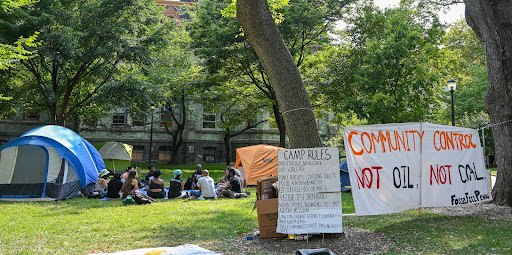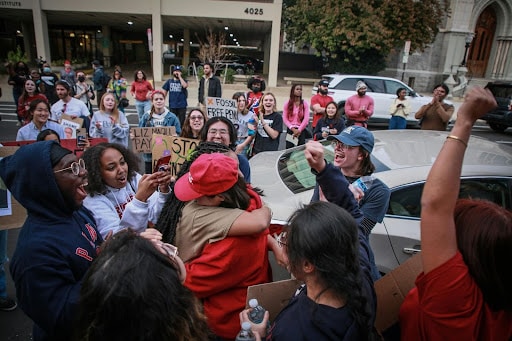When Earth Day was first observed in 1970, more than 20 million Americans participated in demonstrations and events advocating for environmental change, many of which occurred at schools and universities. Today, however, Earth Day has become highly corporatized and greenwashed, with companies using it as an opportunity to sell products. That’s why many college students across the country are choosing to observe Reclaim Earth Day, which recenters the activism that was once at the heart of the environmental holiday.
At the University of Pennsylvania, student-run environmental justice organization Fossil Free Penn is engaging in their own Reclaim Earth Day demonstration, which Eliana Atienza says is a surprise, but will be non-disruptive and center on community education.
“We want to involve the student body and we want to hear about their thoughts on what climate justice means to them,” Atienza, an environmental studies major and a coordinator at Fossil Free Penn, told the Bucks County Beacon. “It’s also a call to action to get involved with us.”
READ: How Protests That Double as Trainings Are Growing This Fossil Fuel Divestment Campaign
According to Atienza, Reclaim Earth Day is a “powerful reminder of our collective power and influence when we choose to rally together, especially across the country.” But this action isn’t something that only happens one day a year.
Fossil Free Penn has been fighting for climate action on campus for the past decade, advocating for the university to fully divest from fossil fuels and cut ties with the fossil fuel industry. The organization is also pushing for the university to invest in renewables and include both Philadelphia residents and the Penn community in their decision-making.

“In the past two years, we’ve had two encampments on College Green, we stormed a homecoming football game, we released a divestment complaint, and along the way we’ve had countless rallies and petitions and press releases,” Atienza said.
During this time, Fossil Free Penn also expanded their demands, calling on Penn to save the University City Townhomes, a low-income housing complex, and make payments in lieu of taxes to Philadelphia public schools.
READ: Marginalized Communities Need Big Environmental Wins
“Often in conversations about climate action, or climate change and what is at stake, I think often the real gritty injustice of it all is left out,” she said, adding that many people, if not most, learn about climate change through statistics and science, which is valid but not motivating.
“What we try to do is highlight the human injustice of it all in the ways that climate change will disproportionately affect poor, low-income communities of color.” Atienza says this has been very effective at getting more students involved.
The university administration’s response to their demonstrations and direct action, however, has often been one of hostility. Fossil Free Penn activists have faced several disciplinary actions for their campus protests and events. In 2022, 19 students were even arrested after student activists stormed the homecoming football game.

During a press conference the organization held to discuss the harassment they were receiving from the university administration, two Penn administrators showed up with a decibel meter, which Atienza says doesn’t happen at other school events. “The idea was – we memorized this – if we had hit above 85 decibels, that is a disciplinary write up and that’s straight to the disciplinary office for us,” she said.
The university has also condemned Fossil Free Penn’s actions in the school newspaper, The Daily Pennsylvanian. “They have stated that our ‘conduct does nothing to advance our legitimate policy concerns.’ That’s the direct quote,” she said.
READ: Time to Move on Bold, New Clean Energy Plan for Pennsylvania
Still, Fossil Free Penn has made significant strides in their goal to get the university to divest from fossil fuels. In 2020, the University of Pennsylvania announced that it will no longer invest in coal and tar sands, which are harmful to the environment, and stopped directly investing in fossil fuel companies in 2022. In March, the university also announced that 70% of its electricity will come from solar energy.
Atienza credits Fossil Free Penn’s activism as a contributor to these changes, but says that there is still “much more that needs to be done,” noting that the ultimate goal is complete divestment in fossil fuels, both direct and indirect.
“When we think about climate action, or at least the direness of the climate crisis, it feels so overwhelmingly hopeless. But when we circle back to Fossil Free Penn’s experience, it gives me a lot of power to think about how the demands that had once been viewed as completely radical have been accepted and acted upon,” she said. “I think the progress that Penn is making is slow, but still progress and significant in some aspects, and is proof that what we are doing – our collective action and our organizing – is working.”







